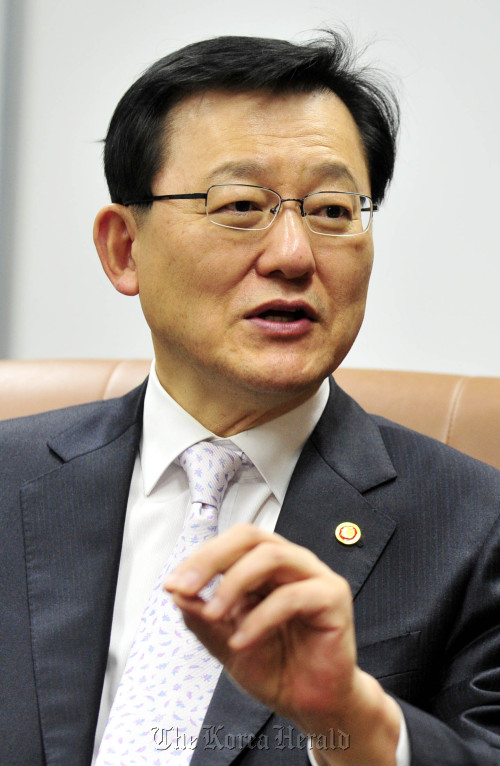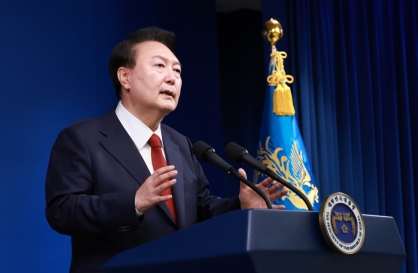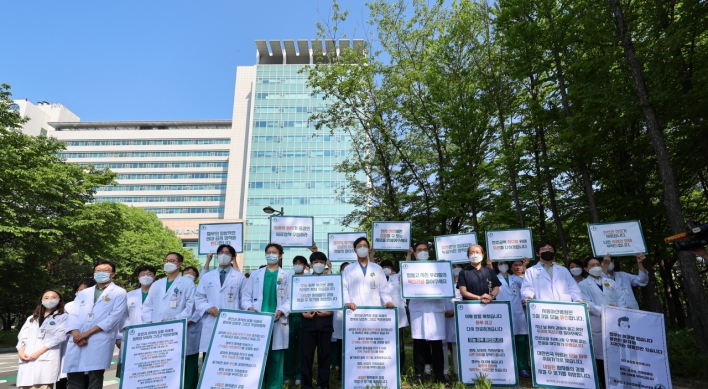Minister Hong wants to be remembered for fostering SMEs into larger, stronger companies, benefit sharing
This is the third of a series of interviews with top officials and trade-related association chiefs on FTAs in light of the Korea-U.S. FTA taking effect. ― Ed.
Knowledge Economy Minister Hong Suk-woo called for aggressive marketing from Korean exporters, in addition to price cuts to maximize the effect of the Korea-U.S. Free Trade Agreement that took effect Thursday.
“Companies could make the most out of the FTA by making proactive marketing efforts in the beginning when the FTA draws great interest,” Hong told The Korea Herald on Wednesday.
“Small businesses often find origin certification troublesome and tricky, but instead of giving up, they should get consulting services from the government,” he said.
Exporters can be slapped with fines by U.S. Customs if they are found to have violated rules on the certificate of origin, which is required to get the tariff benefits under the FTA.
To help small and medium-sized companies make full use of the FTA, the Seoul government has opened an FTA Information and Business Support Center to provide educational programs and consulting services, and receive policy suggestions from them. Officials from the center started making visits to small exporters earlier this week.
The minister stressed that the FTA will comprehensively upgrade Korea-U.S. relations, not just in economic terms but also in terms of security.
This is the third of a series of interviews with top officials and trade-related association chiefs on FTAs in light of the Korea-U.S. FTA taking effect. ― Ed.
Knowledge Economy Minister Hong Suk-woo called for aggressive marketing from Korean exporters, in addition to price cuts to maximize the effect of the Korea-U.S. Free Trade Agreement that took effect Thursday.
“Companies could make the most out of the FTA by making proactive marketing efforts in the beginning when the FTA draws great interest,” Hong told The Korea Herald on Wednesday.
“Small businesses often find origin certification troublesome and tricky, but instead of giving up, they should get consulting services from the government,” he said.
Exporters can be slapped with fines by U.S. Customs if they are found to have violated rules on the certificate of origin, which is required to get the tariff benefits under the FTA.
To help small and medium-sized companies make full use of the FTA, the Seoul government has opened an FTA Information and Business Support Center to provide educational programs and consulting services, and receive policy suggestions from them. Officials from the center started making visits to small exporters earlier this week.
The minister stressed that the FTA will comprehensively upgrade Korea-U.S. relations, not just in economic terms but also in terms of security.

“Korea’s dependence on trade (trade volume divided by the gross domestic production) is nearly 100 percent. In a broad sense, FTAs are not a matter of choice for us, they are a must,” Hong said.
“In addition to the economic benefits, the Korea-U.S. FTA has raised Korea’s global status and strengthened bilateral security ties, which is invaluable.”
The FTA with the United States is the reason the Seoul government expects to maintain a trade volume of around $1 trillion this year, despite the eurozone debt crisis, he said.
The minister said the opposition parties’ demand for a renegotiation or repeal of the FTA was neglecting national interests.
“They should know that scrapping the FTA does not bring its benefits to zero, but to a minus,” he said.
Hong also urged politicians to voice chaebol reform based on reasonable analysis as opposition parties demand reinstating the cap on the top 10 chaebol’s cross-affiliate investments and the ruling party seeks tighter antitrust rules ahead of the parliamentary and presidential elections.
“The growing voice for chaebol reform reflects an antipathy toward large conglomerates encroaching upon business areas of small firms and their lack of efforts for shared growth, which, in a way, the big companies brought upon themselves,” the former head of the Small and Medium Business Administration said.
“But the criticism shouldn’t get in the way of large companies’ job of making the nation’s economic pie bigger and hiring more young people.”
Having taken office in November, Hong said he wants to be remembered as a minister who established the framework for fostering SMEs into larger, more prominent firms, and benefit-sharing between big and small businesses.
The government plans to announce as early as next month a package of measures to nurture solid companies that are no longer SMEs in size.
“These companies that are neither SMEs nor chaebol are the country’s industrial backbone and main driving force of exports,” Hong said.
“We are developing policies to ease their burden of losing the benefits for SMEs, bolster support of their research and development as well as overseas marketing, and improve their public image so they can attract more capable workers.”
He also said benefit-sharing will be the basic tool for shared growth among large and small companies.
The ministry said on Wednesday it will adopt a benefit-sharing certification system next month to offer incentives to big businesses that support their suppliers or other small firms in prearranged contracts. The certification will give the eligible companies advantages in bidding for government procurement contracts, national research and other public projects.
Hong has high expectations for nuclear power plant exports, which he believes can grow into Korea’s new growth engine.
“Construction of some 490 units of nuclear power plants are being considered around the world,” the minister said.
“We are in working-level talks with Turkey and Vietnam on nuclear power plant projects.”
By Kim So-hyun (sophie@heraldcorp.com)
-
Articles by Korea Herald










![[K-pop’s dilemma] Time, profit pressures work against originality](http://res.heraldm.com/phpwas/restmb_idxmake.php?idx=644&simg=/content/image/2024/05/08/20240508050705_0.jpg&u=20240508171126)








![[Today’s K-pop] Stray Kids to drop new album in July: report](http://res.heraldm.com/phpwas/restmb_idxmake.php?idx=642&simg=/content/image/2024/05/09/20240509050659_0.jpg&u=)